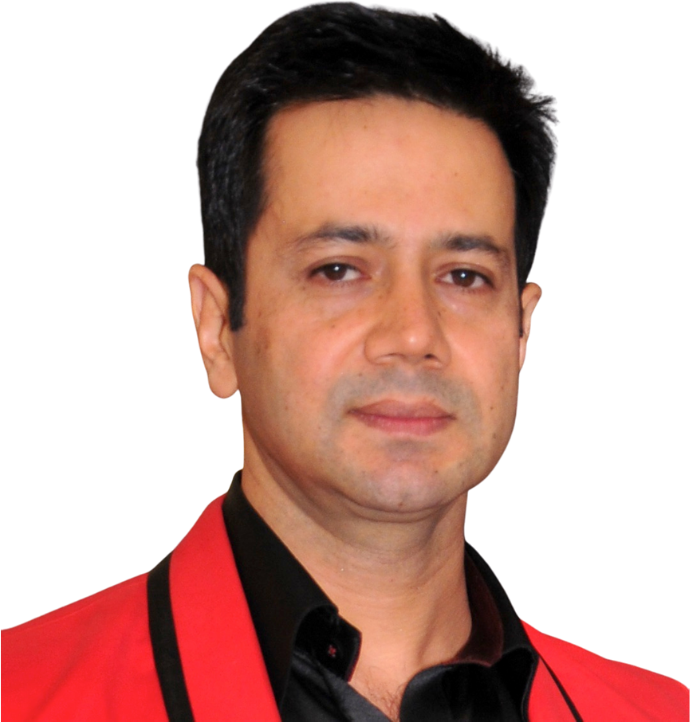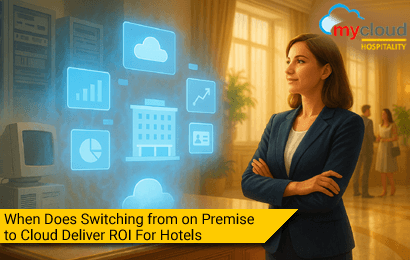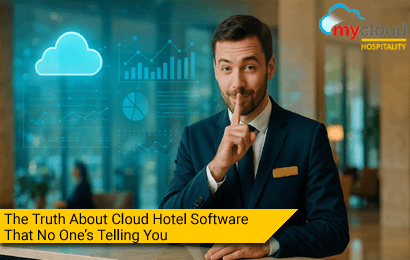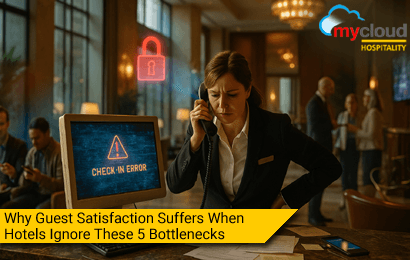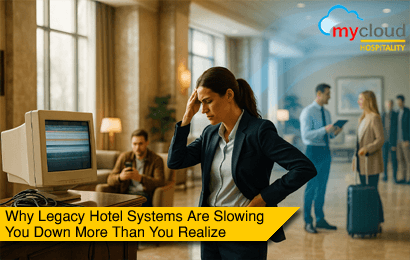Employee retention is one of the most pressing challenges in India’s hospitality industry today. With an annual staff turnover rate of nearly 30% (NRAI India, 2024), hotels face constant pressure to recruit, onboard, and train new staff while ensuring guest satisfaction. Unfortunately, poor onboarding experiences often worsened by outdated hotel technology are a significant factor driving this high attrition. Clunky systems slow down training, frustrate employees, and lead to operational inefficiencies that ripple across the guest experience. But the right hotel management software can transform this challenge into an opportunity. Let’s explore how.
Onboarding Challenges in the Hospitality Sector
In a sector known for seasonal hiring and fluctuating demand, onboarding challenges are a daily struggle for hotel operators. Peak seasons bring a surge of new hires, often with minimal experience, who must quickly adapt to complex hotel operations. Unfortunately, many hotels in India still rely on manual systems paper based checklists, fragmented SOPs, and on-the-job shadowing—to onboard new staff. This lack of a standardized, centralized training approach leads to inconsistent learning and extended ramp-up times.
Research reveals that employees who endure a negative onboarding experience are twice as likely to look for a new job within their first year (Glassdoor, 2023). For Indian hotels, especially independent properties without structured HR frameworks, this translates into a revolving door of staff exits and constant recruitment cycles. Let’s explore how outdated hotel technology compounds this problem.
How Outdated Hotel Tech Makes It Worse
• Steep learning curve – Legacy PMS and POS systems often come with cluttered interfaces and complex navigation, making it extremely difficult for new employees to learn quickly, especially during peak hiring seasons.
• Disconnected systems – Without proper integration, staff must juggle multiple logins across PMS, POS, and CRM systems, wasting valuable time and increasing confusion during already stressful onboarding periods.
• High error rates – Manual data reconciliation between siloed systems frequently leads to billing discrepancies, lost reservations, and missed entries, leaving new staff feeling overwhelmed and guests frustrated.
• Slow processes – Outdated systems require more shadowing and manual training, which extends onboarding timelines significantly and delays new employees from becoming fully productive members of the hotel team.
• Employee frustration – Complex systems discourage new hires who often feel unsupported, leading to demotivation and quicker turnover, which further compounds recruitment and training costs for hotels.
• Guest dissatisfaction – When errors and delays occur due to outdated systems, the guest experience suffers resulting in negative reviews, reduced repeat business, and lasting damage to the hotel’s reputation.
The Domino Effect on Guest Experience
When staff onboarding is inefficient, guest service inevitably suffers. Frustrated and undertrained employees are more prone to mistakes like room assignment errors, billing discrepancies, and missed upsell opportunities. According to a Cornell Hospitality study, hotels experiencing high employee turnover see a 15% dip in guest satisfaction scores a statistic Indian hoteliers can ill afford in a competitive market.
Every negative guest experience impacts a hotel’s reputation, driving away repeat business and eroding long-term profitability. That’s why streamlining onboarding and empowering staff with intuitive hotel management software is not just an operational need but a strategic priority. Let’s see how cloud-based technology addresses these challenges.
How Cloud-Based Hotel Tech Eases Onboarding and Retention
• User friendly design – Modern cloud PMS platforms feature intuitive dashboards and simple navigation, making it easier for new hires to learn workflows quickly without feeling overwhelmed by complicated system processes.
• Guided workflows – Interactive task flows and step-by-step modules guide employees through core functions like check-ins, housekeeping updates, and billing, ensuring consistency and reducing the need for constant supervision.
• Automation of repetitive tasks – Cloud systems automate manual processes such as reporting, billing, and reservation management, cutting down human errors and allowing staff to focus on creating better guest experiences.
• Centralized system – With all departments—reservations, POS, housekeeping, CRM—operating on one platform, staff training is faster, simpler, and more consistent compared to navigating multiple disconnected legacy tools.
• Remote access & training – Cloud-based solutions allow online training modules, mobile device access, and remote learning opportunities, which makes onboarding more flexible and efficient for hotels with high seasonal hires.
• Faster onboarding – Real-world examples, such as Hablis Hotel Chennai, prove cloud PMS can reduce onboarding timelines from weeks to just days, enabling staff to be guest-ready faster.
• Lower costs – By reducing training time, minimizing errors, and cutting reliance on expensive in-person training, cloud PMS platforms help hotels lower onboarding costs by up to 40% annually.
How to Choose the Right Hospitality Tech
Choosing the best hotel management system is crucial for long-term success. Here’s what hoteliers should prioritize:
• Ease of Use: Opt for systems with intuitive dashboards that require minimal training.
• Integration Capabilities: Ensure your PMS integrates seamlessly with POS, channel managers, accounting, and CRM to avoid operational silos.
• Scalability: The system should grow with your business, whether you manage a boutique hotel or a chain of properties.
• 24/7 Support & Training: Essential for smooth transitions and quick issue resolution.
• Real-Time Insights: Access to analytics and reports that help improve workflows and guest satisfaction.
Platforms like mycloud PMS—All your hotel tools in one place provide an end-to-end solution with 200+ ready integrations and an open API, ensuring that your property is future-ready.
Challenges While Adopting New Tech
Adopting new hotel technology isn’t without hurdles. One of the primary challenges is resistance to change among employees. Long-standing staff members often fear that new systems will complicate their routines or render their skills obsolete. Clear communication, hands-on training, and demonstrating tangible benefits are key to overcoming this barrier.
Another critical challenge is ensuring proper data migration from legacy systems. This process must be planned meticulously to prevent data loss or discrepancies that could disrupt operations.
Finally, it’s essential to balance automation with personalized guest experiences. Technology should augment—not replace—the human touch that defines hospitality. Managers need to be trained to use real-time reports and guest insights to deliver customized services rather than rely solely on automated workflows.
How mycloud Hospitality Helps Hoteliers Navigate These Challenges
mycloud Hospitality is built to simplify hotel operations while enhancing staff efficiency. Unlike fragmented legacy systems, mycloud PMS offers an integrated, cloud-based platform where all hotel functions—reservations, front desk, POS, housekeeping, CRM, and reporting—operate seamlessly within a unified dashboard.
With 200+ ready interfaces and an open API, mycloud ensures smooth connectivity with third-party applications, eliminating silos and reducing login fatigue. The intuitive interface reduces onboarding time for new hires, while interactive training modules and AI-powered workflows guide staff through their daily tasks, minimizing errors.
Moreover, mycloud’s robust reporting and analytics provide managers with real-time insights into staff productivity, guest preferences, and operational bottlenecks, enabling proactive decision-making. By streamlining processes and offering 24/7 support, mycloud ensures that technology becomes an enabler, not a barrier, to employee satisfaction and retention.
Whether you’re managing a single boutique hotel or scaling up to multiple properties, mycloud Hospitality your complete hospitality management platform—has all the tools you need in one place.
Conclusion: Fixing Retention Through Smart Onboarding
Poor onboarding isn’t just an HR problem—it’s a tech problem. Outdated systems make training tedious, frustrate staff, and ultimately degrade the guest experience. On the other hand, cloud-based solutions like mycloud PMS streamline workflows, reduce onboarding time, and empower employees with intuitive tools that allow them to focus on guest satisfaction.
Hotels that invest in modern, easy-to-use, and fully integrated technology are more likely to retain skilled staff, reduce operational errors, and stand out in a highly competitive market.
Start your 30-day free trial with mycloud Hospitality today. Experience how seamless onboarding and an all-in-one hotel management ecosystem can transform your operations.
Onboarding & Tech: Questions You Might Have
• How does technology impact staff training in hotels?
Legacy systems make onboarding longer and more confusing. Cloud-based PMS, on the other hand, has intuitive dashboards and guided workflows that allow staff to learn quickly and confidently.
• Can cloud-based hotel software really reduce training costs?
Yes. Studies show cloud hotel PMS can cut onboarding costs by up to 40%, since training is faster, error rates are lower, and staff feel more productive from day one.
• Will adopting new technology frustrate my existing staff?
Change can feel intimidating at first, but modern cloud PMS is designed to be easy-to-use. With proper training and support, most staff adapt quickly and appreciate the time savings.
• How does better staff onboarding improve guest satisfaction?
When employees are confident and efficient, they make fewer mistakes and focus more on service. This leads to smoother check-ins, accurate billing, and overall happier guests.


